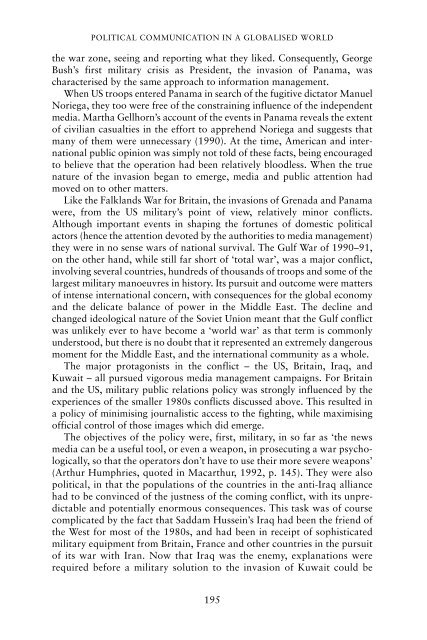20130412164339753295_book_an-introduction-to-political-communication
20130412164339753295_book_an-introduction-to-political-communication
20130412164339753295_book_an-introduction-to-political-communication
You also want an ePaper? Increase the reach of your titles
YUMPU automatically turns print PDFs into web optimized ePapers that Google loves.
POLITICAL COMMUNICATION IN A GLOBALISED WORLD<br />
the war zone, seeing <strong>an</strong>d reporting what they liked. Consequently, George<br />
Bush’s first military crisis as President, the invasion of P<strong>an</strong>ama, was<br />
characterised by the same approach <strong>to</strong> information m<strong>an</strong>agement.<br />
When US troops entered P<strong>an</strong>ama in search of the fugitive dicta<strong>to</strong>r M<strong>an</strong>uel<br />
Noriega, they <strong>to</strong>o were free of the constraining influence of the independent<br />
media. Martha Gellhorn’s account of the events in P<strong>an</strong>ama reveals the extent<br />
of civili<strong>an</strong> casualties in the effort <strong>to</strong> apprehend Noriega <strong>an</strong>d suggests that<br />
m<strong>an</strong>y of them were unnecessary (1990). At the time, Americ<strong>an</strong> <strong>an</strong>d international<br />
public opinion was simply not <strong>to</strong>ld of these facts, being encouraged<br />
<strong>to</strong> believe that the operation had been relatively bloodless. When the true<br />
nature of the invasion beg<strong>an</strong> <strong>to</strong> emerge, media <strong>an</strong>d public attention had<br />
moved on <strong>to</strong> other matters.<br />
Like the Falkl<strong>an</strong>ds War for Britain, the invasions of Grenada <strong>an</strong>d P<strong>an</strong>ama<br />
were, from the US military’s point of view, relatively minor conflicts.<br />
Although import<strong>an</strong>t events in shaping the fortunes of domestic <strong>political</strong><br />
ac<strong>to</strong>rs (hence the attention devoted by the authorities <strong>to</strong> media m<strong>an</strong>agement)<br />
they were in no sense wars of national survival. The Gulf War of 1990–91,<br />
on the other h<strong>an</strong>d, while still far short of ‘<strong>to</strong>tal war’, was a major conflict,<br />
involving several countries, hundreds of thous<strong>an</strong>ds of troops <strong>an</strong>d some of the<br />
largest military m<strong>an</strong>oeuvres in his<strong>to</strong>ry. Its pursuit <strong>an</strong>d outcome were matters<br />
of intense international concern, with consequences for the global economy<br />
<strong>an</strong>d the delicate bal<strong>an</strong>ce of power in the Middle East. The decline <strong>an</strong>d<br />
ch<strong>an</strong>ged ideological nature of the Soviet Union me<strong>an</strong>t that the Gulf conflict<br />
was unlikely ever <strong>to</strong> have become a ‘world war’ as that term is commonly<br />
unders<strong>to</strong>od, but there is no doubt that it represented <strong>an</strong> extremely d<strong>an</strong>gerous<br />
moment for the Middle East, <strong>an</strong>d the international community as a whole.<br />
The major protagonists in the conflict – the US, Britain, Iraq, <strong>an</strong>d<br />
Kuwait – all pursued vigorous media m<strong>an</strong>agement campaigns. For Britain<br />
<strong>an</strong>d the US, military public relations policy was strongly influenced by the<br />
experiences of the smaller 1980s conflicts discussed above. This resulted in<br />
a policy of minimising journalistic access <strong>to</strong> the fighting, while maximising<br />
official control of those images which did emerge.<br />
The objectives of the policy were, first, military, in so far as ‘the news<br />
media c<strong>an</strong> be a useful <strong>to</strong>ol, or even a weapon, in prosecuting a war psychologically,<br />
so that the opera<strong>to</strong>rs don’t have <strong>to</strong> use their more severe weapons’<br />
(Arthur Humphries, quoted in Macarthur, 1992, p. 145). They were also<br />
<strong>political</strong>, in that the populations of the countries in the <strong>an</strong>ti-Iraq alli<strong>an</strong>ce<br />
had <strong>to</strong> be convinced of the justness of the coming conflict, with its unpredictable<br />
<strong>an</strong>d potentially enormous consequences. This task was of course<br />
complicated by the fact that Saddam Hussein’s Iraq had been the friend of<br />
the West for most of the 1980s, <strong>an</strong>d had been in receipt of sophisticated<br />
military equipment from Britain, Fr<strong>an</strong>ce <strong>an</strong>d other countries in the pursuit<br />
of its war with Ir<strong>an</strong>. Now that Iraq was the enemy, expl<strong>an</strong>ations were<br />
required before a military solution <strong>to</strong> the invasion of Kuwait could be<br />
195
















